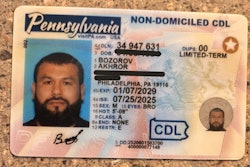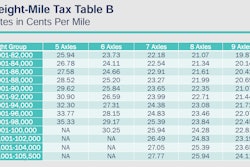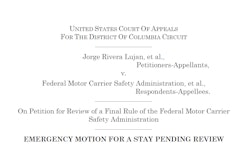Owner-operator Jorge Rivera Lujan won a massive victory in court last week when his lawsuit brought the United States Department of Transportation's most aggressive regulatory action in years to a grinding halt, but it still doesn't look like he'll be getting his CDL back any time soon.
Lujan, along with unions representing teachers and government workers, in October petitioned the U.S. Court of Appeals in the District of Columbia Circuit to stop the DOT's Federal Motor Carrier Safety Administration from changing licensing rules for non-citizen drivers.
FMCSA stated that it found problems with the integrity of state licensing systems, and that it intended to force nearly 200,000 non-domiciled CDL holders out of the industry.
[Related: DOT reveals the real reason it's pushing out 200,000 non-domiciled CDL drivers]
After back and forth court filings from FMCSA and Lujan's legal representation, the court last week blocked FMCSA's Interim Final Rule (IFR) on non-domiciled CDL issuance for at least a few months until it heads to litigation.
Three days after the court initially paused the rule (before granting petitioners' requested emergency stay more definitively late last week), Lujan returned to the Utah DMV, paperwork in hand, to renew his CDL. Only Utah wouldn't do it, as documented in a video posted to TikTok by Lujan.

The FMCSA emergency rule essentially shut down non-domiciled CDL issuance on September 29. It took some time, but eventually nearly every state complied with the order to stop non-domiciled CDL issuance entirely pending new processes in place to limit issuance to non-citizens. The court paused the rule November 10.
Three days later, FMCSA's Office of Safety wrote all 50 states and said "until further notice, States are not prohibited from issuing non-domiciled CDLs and commercial learner’s permits in accordance with the FMCSA’s regulations and guidance in effect immediately prior to issuance of the interim final rule."
Has any state actually gone back to the pre-IFR status quo on non-domiciled CDLs?
Overdrive contacted more than a dozen since the court decision and found that despite Lujan's big win and FMCSA's message to states about the pause, not a single state Overdrive spoke to would license Lujan. That includes all six of the states FMCSA's emergency rulemaking called out for inconsistencies with federal regulations on CDL issuance, as well as a few other states identified as hubs of non-domiciled CDL issuance.
[Related: Six states issuing CDLs 'not consistent with federal regulations': What's going on]
 This graphic from Overdrive's July examination of non-domiciled CDL issuance in all 50 states flags in red the states with more than 5,000 active non-domiciled CDLs.
This graphic from Overdrive's July examination of non-domiciled CDL issuance in all 50 states flags in red the states with more than 5,000 active non-domiciled CDLs.
Arizona
Arizona wasn't one of the six states DOT called out in its rulemaking, but it was identified by Overdrive in July as a major issuer of non-domiciled CDLs, with 6,103 such licenses active in the state.
Asked if they'd kept up with the back-and-forth legal filings and court rulings, Arizona explained it's following the FMCSA rule's orders, not the court's.
"The Arizona Department of Transportation Motor Vehicle Division paused their issuance of non-domiciled CDLs in order to meet the new requirements, and has since restarted issuance based on the IFR requirements," a spokesperson told Overdrive. "ADOT MVD will continue issuing based on the new IFR and monitor the progress as it makes its way through the legal and rulemaking process."
Issuing non-domiciled CDLs in line with DOT's new rule means that just about three percent or so of applicants, only those with special work visas, can get non-domiciled CDLs in the state.
Colorado
Colorado was one of the states called out by regulators for inconsistencies with federal rules, and the state said it hadn't started issuing non-domiciled CDLs again.
"Colorado paused the issuance of 'term-limited' CDLs when the Federal Motor Carrier Safety Administration (FMCSA) issued its Interim Final Rule (IFR) effective September 29, 2025," said a representative from Colorado's DMV. "We are aware of the stay issued by a federal court this past Monday and are still evaluating potential impacts. We will continue to evaluate as the case proceeds."
Michigan
Another big issuer of non-domiciled CDLs with 6,809 active credentials noted in Overdrive's July report, Michigan shut down all non-domiciled CDL issuance after the FMCSA's IFR and hasn't restarted its program.
"Michigan stopped issuing non-domiciled CDLs on October 1, 2025," a Michigan Department of State spokesperson told Overdrive. "We have not resumed issuing non-domiciled CDLs."
As for when they might resume, "Michigan is evaluating the modifications needed to comply with the rule," the spokesperson concluded.
New York
New York didn't get called out specifically by DOT, nor did it provide data on how many non-domiciled CDLs it's issued. Still, the fourth most populous state hasn't budged yet on the court's order.
New York's "DMV is aware of the recent stay issued by the U.S. Court of Appeals District of Columbia Circuit," a rep there said. "Issuance of non-domiciled CDLs continues to be paused in New York. We are in the process of reviewing that order to determine any impacts in New York."
Ohio
Ohio, another big player in non-domiciled CDL issuance with more than 5,000 active credentials, responded at length to DOT's final rule, and also hasn't changed anything after the new court order.
"Even with the court ruling, we have not resumed issuance of CDLs," a representative from Ohio's Bureau of Motor Vehicles told Overdrive. "This is because FMCSA has asked every state to audit its compliance to the previous rule, identifying if there were any findings of non-compliance. The BMV is still reviewing, to ensure adherence to all federal laws."
A release from the state's BMV further explained that "FMCSA requires states to come into 'substantial compliance' prior to issuing, transferring, renewing, or upgrading a non-domiciled CLP or CDL," and that non-compliance could result in Ohio losing federal funds.
As such, Ohio BMV has paused issuance and testing, as well as issuing duplicates, making changes, upgrading or renewing non-domiciled CDLs, until the state makes "all necessary modifications to the Ohio Non-Domiciled CDL program," Ohio BMV said, adding it would "communicate eligibility to the public" after necessary modifications were made.
Pennsylvania
Pennsylvania, one of the six states called out by DOT, confirmed it hadn't yet restarted issuance non-domiciled CDLs since the FMCSA's rule change.
"PennDOT paused issuance of non-domiciled Commercial Driver Licenses (CDLs) and Commercial Learner’s Permits (CLPs) as directed by FMCSA when they issued the IFR," a PennDOT representative told Overdrive.
The state did say it's aware of the court ruling and that it will "continue to review our next steps relative to non-domiciled CDLs and CLPs."
South Dakota
Another state DOT said improperly issued some non-domiciled CDLs, South Dakota said it found what was wrong, fixed the problem, and hasn't restarted issuing non-domiciled CDLs yet.
"We have addressed and corrected six discrepancies found in the recent audit," South Dakota's Department of Public Safety told Overdrive. "Issuance of non-domiciled CDLs are still on hold as we work to ensure our processes are compliant with current FMCSA guidance."
Texas
Texas, both a mega-issuer of non-domiciled CDLs with 8,507 active credentials identified in Overdrive's July report and some 50,000 issued in the last decade, as well as one of the states with inconsistencies flagged by DOT, said it hasn't restarted issuing non-domiciled CDLs.
"The issuance of non-domiciled CDLs in Texas remains paused at this time," a Texas Department of Public Safety spokesperson said. "We are conducting a review of our processes and rules before making a final determination regarding the issuance of non-domiciled CDLs."
Virginia
Virginia wasn't one of the six states called out by DOT for bad licensing practices, nor did it provide data on how many non-domiciled CDLs it has issued.
But it did offer insight on the court's pause of FMCSA's rule. The Virginia DMV stopped issuance of non-domiciled CDLs on September 29, and for now, it will stay that way.
The court's stay of the rule "effectively paused implementation of the IFR to allow the court sufficient time to consider the case," a Virginia DMV spokesperson said. "Given this action is a temporary pause and not a ruling on the merits of the IFR -- and that stopping and starting allowance of the training and licensing process is costly and disruptive to both students and schools -- the Virginia DMV will continue to pause issuance of non-domiciled CDLs."
Washington
Washington felt the heat directly from DOT after an audit found the state had incorrectly issued a full-term CDL to driver Harjinder Singh, whose illegal U-turn on the Florida turnpike resulted in three crash fatalities in August. The state's Department of Licensing said it hasn't resumed non-domiciled CDL issuance just yet.
"Washington is not currently issuing non-domicile CDLs," a DOL rep told Overdrive. "We are working to ensure compliance with all applicable rules so that we can resume issuing the licenses."
California
California likely represents the country's leading issuer of non-domiciled CDLs with some 65,000 issued, according to the state's recent letter to DOT. California's also home of the most "egregious" licensing violations, according to federal authorities.
DOT Secretary Sean Duffy has repeatedly called out the state, both in heated, meme-filled social media battles with California Governor Gavin Newsom and in official actions, with a letter to California demanding a total shutdown and audit of the state's non-domiciled CDL issuance.
California DMV did not directly respond to Overdrive inquiries about non-domiciled issuance following the court order, but had previously said it stopped issuing such CDLs in September following DOT's IFR. (The state in mid-October would admit to upgrading a non-citizen's non-domiciled CDL days before a deadly crash, but otherwise California said it's in compliance.)
But DOT has spoken on California's behalf, issuing a press release saying the state was revoking 17,000 non-domiciled CDLs.
In FMCSA's guidance on its new IFR, it notes the court order blocking the rule, but makes special note of what happens with California:
States that are subject to a corrective action plan that imposes a pause on non-domiciled CLP and CDL issuance until evidence of compliance with FMCSA’s regulations and guidance, in effect immediately prior to issuance of the interim final rule, has been provided to FMCSA must continue to comply with the requirements of the plan.
California is the only state Overdrive has identified that's under a corrective action plan, and therefore it's likely California won't be able to start issuing non-domiciled CDLs again until it gets right with agency and the DOT.











